#erikson
Text

With what lurks around dark corners
#call of duty#modern warfare#call of duty modern warfare#MWII#Phillip Graves#blender renders#OC: Jax#Jackie Ramirez#Ship: High Places#Erikson#Dipaolo#Vance#this took foreVVERVRVR#bHBGDBBGB but I'm finally done with it god damn#okay listen.#graves is burned#which means the 3 stooges should definitely be dead but listen#it's about the vibes#au or sum idk#but fucknng jack covering Graves' left because of his borked eye#:))))#shadow company
102 notes
·
View notes
Text
Fuckyoufuckyoufuckyoufuckingdie!
-Anyx Fro - The God Is Not Willing
By Steve Erikson
2 notes
·
View notes
Quote
The more you know yourself, the more patience you have for what you see in others.
Erik Erikson
18 notes
·
View notes
Text
About Me 13 | BTS, Taking a Break, and Erikson’s Stages of Psychosocial Development
Special thank yous to the following!
@yuugehn! I so appreciated our discussion about so much of this! I originally was going to tag every line from our conversations lol, but for anyone reading this, please know that so much of this post, especially regarding observations about the Festa dinner, come from yuugehn’s gorgeous brain and heart!
@The Hornies! Over the 2 years we’ve gotten to know each other, we’ve talked about the themes discussed here. Thanks for being down to discuss these sorts of things with me and being so generous with your friendship.
I’ve been thinking about writing this post for a while. It’s going to be a loooooong post. It has been in my drafts for months because I wanted to talk about BTS’s career trajectory and how it plays off of their identities as individuals, as well as a group, in Erik Erikson’s life stages. It’s also about observations I made about my own fan experience, especially related to their concerts in Las Vegas. I wasn’t sure when my thoughts would come together.
To borrow Jungkook’s words from the Festa dinner, “Today’s the day.”

It all clicked this week due in part to the people mentioned up top, as well as other dear friends, old and new. And this has actually become a very, very personal post.
Whenever I’m having big emotions, my overeducated ass likes to lean on psychology frameworks. I try not to over-intellectualize in a way that diminishes my feelings, but I do find that applying such frameworks helps me gain perspective about those feelings. It even helps me validate my feelings. When I can see how my feelings fit into some kind of core psychological principle, I start to sense that I’m not alone. I find comfort in the fact that people have felt what I’m feeling under similar circumstances, and enough of those people have felt those feelings that someone made a damn framework.
So if you’re still sorting through your feelings about the break, and you love psychology as much as I do, let’s peep into Erikson’s brain microscope for a little while to gain some of that perspective. And then, if you’re interested, I’ll share some personal thoughts about it all, ones that are challenging and a bit scary to share, but ultimately have led me to feel a new, refreshing, optimism about life!
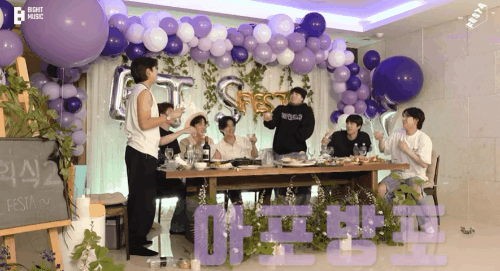
OK, let’s start with the psych stuff!! 🤩
Erik Erikson was a developmental psychologist who drew upon Freud’s psychodynamic work to identify key stages to human life. He’s actually the first person to come up with the term identity crisis, and he labels each stage based on a certain crisis, or conflict, that people grapple with during that age. It’s this investigation that makes Erikson’s classic model of eight stages so relevant to what BTS and ARMY might be experiencing right now.
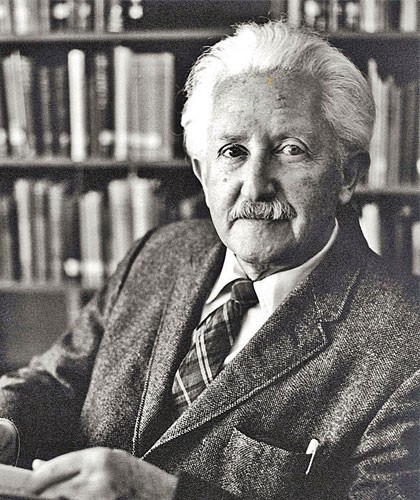
source: medium
I won’t go through all of the stages in depth, but here are some key things to know:
Though ages are roughly associated with each stage, you don’t necessarily have to go through these stages linearly or according to that timing
Stages can overlap
It is possible to “fail” a stage
If you “fail” a stage, you can still move on/through the other stages, which means you can also revisit stages as you grow
Here’s a quick infographic that summarizes the eight classic stages. We’ll be zooming into Adolescence, Young Adulthood, and Middle Adulthood, and how they’re all currently overlapping for the members of BTS!

Adolescence: Identity vs. Role Confusion (ages 12 to 18)
During this stage, our life events help us determine our identities. We do this by comparing and contrasting old experiences that we had when we were younger (i.e., what our loved ones taught us, showed us, instilled in us) with new experiences that we start to learn about at these ages (e.g., as we make deeper friendships outside of the home, and as we see more of the world). If we are successful, we come away with a strong sense of self; we know who we are, what we like, what we believe, etc. If we are unsuccessful, we come away from this stage perhaps thinking that we know these things, only to find out later that we go through an identity crisis, during which we are left questioning who we are.
Interesting things to note about this particular stage are that 1) Erikson believed that this stage can take a much longer time, especially in technologically advanced societies, because it takes us longer to adapt skills to navigate such a world, and 2) Erikson believed this stage is prolonged for people who are labeled geniuses in society.
If we take that to be true, it’s easy to see how the members went so long without a break, and thus now need that break to check back in with themselves. The ages seem to line up here. They started in their mid to late teens / early 20s; so much of their adolescence was defined for them, and it’s coming to a head now. They’ve been operating in one mode for so long, and they’ve led rigid lifestyles that have predefined so much of their identities — I mean, from the start, they were labeled as vocal line, rap line, dance line, etc., and it makes sense that they’re now questioning these things in order to expand and grow.
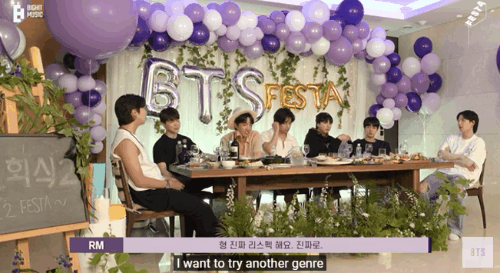
When people grapple with the central conflict of this life stage, there is a need for exploration, which is what the members hope to do now. They all need a way to test their identities to see what holds, and what doesn’t. What sticks. What they can add. What they can redefine. The members of BTS need this time for experimentation so as not to fall into identity crisis territory.
One comforting thing to see, though, is how the members are also leaning on the group identities that have crystallized to help them through that experimentation! Hobi plays an integral role here! Hobi’s role as the internal-facing leader helped him (and, thus, all of them) broach the topic of needing a break. Hobi was the first to question the group dynamic, with that story of him threatening to leave the group in the early days. He is also critical of the members when it comes to needing to slow down.
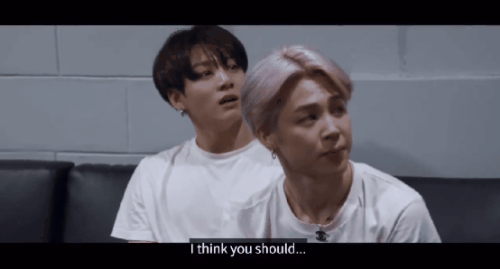
source: bffjeongguk
Compare that with the way Namjoon expressed the weight that he carried on his shoulders as the external-facing leader. His role has been focused on keeping them together as a unit; Namjoon is the peacemaker, the diplomat.
Hobi, though, shepherds the groups’ individuality. He is critical of them as individuals in order to help them each succeed on their own terms. And it makes sense that he’s the first to showcase his solo work, thus leading the way. The others have looked to Hobi in this way, too, like how Jimin has shown Hobi all of his solo work before the others. Namjoon said that he kept putting off the much-needed break; it’s almost as if Namjoon needed Hobi to tell him it was time, and as a result, they all are looking to Hobi to help them start their new chapters. A necessary changing of the guard of leadership in a way, perhaps, to help the group evolve.

Early Adulthood: Intimacy vs. Isolation (ages 20-44)
During this stage, our life events help us determine our connections to others. It may seem like BTS have the intimacy thing down-pat, given their close bond. But, importantly, being too enmeshed with others can also lead to disconnection. Being in the group too long could lead to isolation from others in their lives, depriving them of any growth they may have made in forming their own identities. This is not a completely foreign concept to BTS, as people, as well as artists.
Think about Trivia: Seesaw. Yoongi’s message in that song is about the inability to leave a toxic relationship that has struck only the illusion of balance, and the protagonist in the song ultimately decides to get off and move on with their lives. Though the dynamics within BTS aren’t fraught with toxicity, the same challenge is still there; the members felt like they weren’t being genuine, and it’s time to do something about it.

A key marker of success in this stage is whether people can make certain sacrifices in order to preserve that intimacy. Arguably, the members of BTS need to make a certain kind of sacrifice of time and space in order to preserve the family that they’ve built together. Take that with the lesson from Trivia: Seesaw, and it’s easy to see why they’re so eager to try new things and spend time with other people.
But you’re also seeing them do that in a way that is familiar to them. They’re making their own music, but they’re sharing that music with each other before they release it into the world. Apparently, Taehyung is even doing an In the Soop spin-off. It’s a way to put that intimacy to the test in order to come out of this stage successfully. It’s clear that they trust that their unconditional love for each other will remain intact, and that’s a really comforting thing to see, as well as a healthy way to model growth.

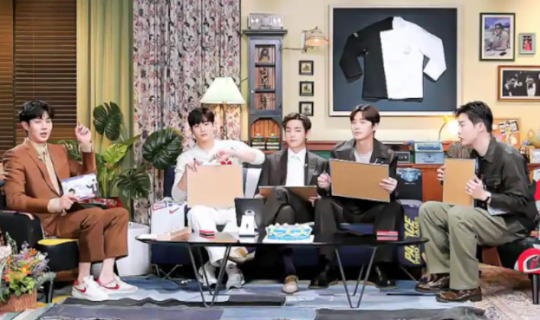
source: bollywoodlife
Middle Adulthood: Generativity vs. Stagnation (45-64)
It makes sense that as we start to move into the “old man” stage that Min “I Speak 3 Languages, Play A Million Instruments, and Do Pilates Now” Y🍑🍑ngi’s schedule comes into play! It’s amazing! And, interestingly enough, it’s a nice example of how one may address the core conflict in this stage!
During this stage, our life events help us identify our impact on others and the world. When we are successful, we feel proud and accomplished. When we are unsuccessful, we feel dissatisfied and stale. Much of what comes up in this stage is discussed in a familial setting, and it just so happens to work well here, as BTS even shared that they feel more like family.
Now, we’ve established that stages can overlap, that they’re not necessarily linear, and that geniuses often spend much longer in the Identity vs. Role Confusion stage. Given the universal scope of their influence and achievement, and understanding their words in that context, I don’t think it would be outlandish to assume that there is a bit of an acceleration to the Generativity vs. Stagnation stage. And they each give examples of how they are experiencing this conflict through the central tasks associated with this stage.

One particular central task of this stage is to create a home. Because their house contract (lease?) is up, they’ve settled into their own places, separate from each other. Seems like they’ve got this one set, but it’s worth it to celebrate that they each get to incorporate their own voices in the way that they decorate and set up their new places, with as many mattresses aas Jungkook wants to have and saw in half lol.
When it comes to the other tasks, let’s break it down by member.

Namjoon. One task of this stage is relinquishing past roles. Here we go with Namjoon… Oooof, I feel for Namjoon. I wish I could tell him that I’ve been there, very recently. I’ve shared before that Namjoon is extremely focused on legacy. So it makes sense that he’s hitting on two central tasks: relinquishing a central role in the lives of grown children, and being proud of one’s accomplishments. If he is the external leader of BTS, then the rest of the group can be perceived as his “children”, or “followers”, to a certain extent.
It’s clear that relinquishing this role is particularly tough for him, given what he shared, and how emotional he was when he shared it. Similarly, Namjoon seems to be battling stagnation pretty hard when it comes to his identity as a leader and creator. He voiced feeling lost, as any leader without anyone to lead would feel, and this has crossed over into his difficulty writing new music. I think that’s why he’s so interested in art — he’s lost his own voice, and he’s looking to other artists in other media to help him express himself. I’m thinking about how he felt after seeing that Rothko piece. He’s wanting to feel again, and he mentioned needing new life experiences, new stimuli, to have something to say.
And he’s scared about what happens if he doesn’t get that. He’s scared about what will happen, and whether he will disappoint people, on top of already feeling he’s disappointed ARMY and his fellow members. He has a hard time feeling pride in his accomplishments because he was feeling so disingenuous when working toward them. It makes sense that he would want to revisit that now and get back to a place of generativity, to impact the world in a way that is positive and healthy. To do that, he recognizes that he needs new experiences, and that is a commendable thing to state while being in the position he’s in now.
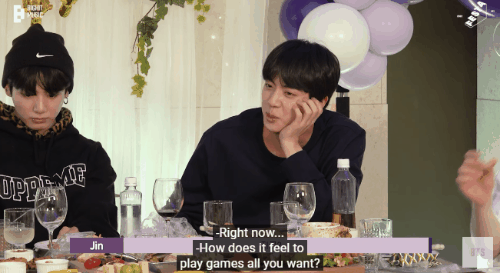
Jin. Some crises in this stage include adjusting to the physical changes of older age, a sense of regret for unfulfilled goals, a desire to spend time alone, and a desire to feel young again. Jin’s physicality certainly seems to be relevant here; he was recently injured, and we’re all thinking about his age and perhaps his oncoming military duties, which will have an impact on what comes next. He talked during the dinner about how he doesn’t necessarily regret not acting, but that means that he had to think about it, process that he hadn’t become an actor like he thought he would or might like to be, though he certainly still has time to do so. That’s also a part of life — realizing that you do have more time than you think you do in many ways, something that I’m also learning. The desire to spend time alone and to feel young again seems to surface when Jin was talking about shutting himself away and playing games for days straight, bur Erikson also points out that people often come back from these behaviors feeling unfulfilled. So though I don’t know if Jin is necessarily experiencing a quarter/mid-life crisis (I mean, how much do we really know about what they’re experiencing), these kinds of behaviors are often seen in this stage.
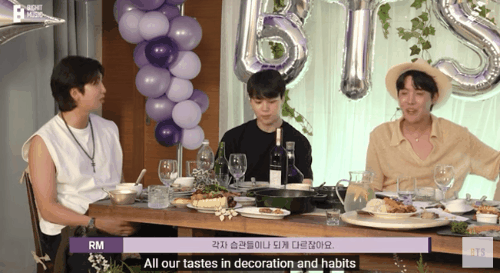
Yoongi. This stage also brings about homemaking, reexamining our behaviors, using leisure time creatively, and passing on our lessons to those younger than us, whether through family or instruction. So it makes sense that Yoongi seems to be thriving in this space of generativity. He’s making his house into a home, picking up healthy life behaviors, feeling inspired to use his leisure time creatively, and passing on wisdom and information to the next generation (young songwriters). In fact, let’s compare and contrast the “young songwriters” thing; Yoongi found joy in being able to share advice with them (generativity), whereas Namjoon felt slighted that no one was coming to him (stagnation). It’s almost as if Namjoon’s role as a leader forced his own adolescence / identity development to be that much more stunted — or maybe also his own genius getting in the way! Meaningful work is also a huge part of the generativity vs. stagnation stage — people who find meaning in their work find it through contact with others, opportunities for growth and maturity in their craft, and a level of independence as they explore. Yoongi is getting exactly this, which maybe explains why he was so happy during the dinner, save for having empathy for the other members when they were expressing their fears. All of this helps to explain Yoongi’s glow-up. And it seems consequential that this is the “old man” stage lol.
Hobi. I talked about Hobi up at the top, so this section will be short. Hobi is leading the charge when it comes to helping growing and grown children to be responsible adults. Again, Hobi is the first to debut his solo work, and he’s performing at Hobipalooza — I mean, Lollapalooza, lol. But he also needed to help the others to see that they are ready to do it, too.
Jimin. Obviously, interpersonal relationships are key in this stage; those that are solid hopefully continue to grow, and those that aren’t start to fall away. During this stage, love matures past more shallow definitions, or purely sexual definitions. ARMY talks about Jimin being pure love, and that’s something that I thought about a lot when writing him in Bear with Me (i.e., a discussion about whether there is such a difference between platonic vs. romantic or other types of love). He’s done so much to stay true to himself and express that love in a way that is visible. He hugs, he smiles, he asks people to tell him that they love him, but he doesn’t just want it for surface reasons. He really means it, and he needs people to mean it when they say it back. I think this also makes him vulnerable to enmeshment, where he starts to lose himself in that love. And that’s why I think the solo chapter seems to be hard for him to stomach:
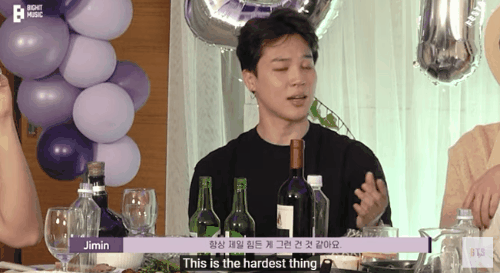

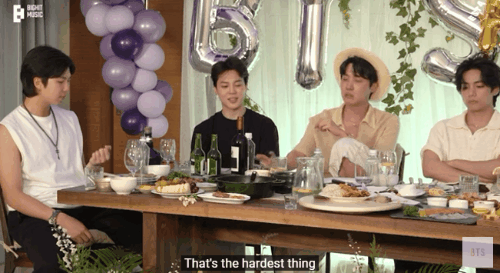
Taehyung. When it comes to Taehyung and Jungkook, I see a mix of all of this as they play out in identity, which is something I think Taehyung is experimenting with, and maturity, which is something Jungkook is developing.

I think I have less to say about Taehyung because he’s so open about his experimentation, and that’s really all there is to it. He’s experimenting with change, trying on new identities, new hobbies, new friends. Though he is an introvert, he seems to be the most outwardly social with other idols and celebrities, and his feeds are all about him trying on new clothes and looks, or having new experiences out in the world. Seeking out this type of change is typical at this stage of life as well, and with Taehyung’s openness to experimentation, it’s cool to see this particular habit surface at a time when he has unlimited resources and opportunities.
Jungkook. Interestingly, or maybe even unsurprisingly (he is the golden maknae, after all), Jungkook is the one who is developing a certain level of maturity. He seems to be stepping into a balance of all things, just like how the guys say that Jungkook is a mix of all of his hyungs — especially all the best parts of them. Namjoon pointed out that he rambled on and on about what he was feeling, and Jungkook was so concise and well-spoken, but Jungkook also benefitted from the hyungs sharing their thoughts first as he essentially summarized them. With their wisdom, he is taking on all of the tasks mentioned, and he’s figuring out his own take on them. And that’s why he seems like he’s so mature.

Like Namjoon and Hobi, he’s in one way relinquishing control and being forced to trust what the future will bring, while also developing his own abilities as a leader / caretaker — like adopting Bam! He’s creating his own space, his own home, his own sound, the way that he wants, and I think that his confidence is shored up by Yoongi’s, as he so determinedly said that he will release his music after Yoongi does. They’ve talked about his capacity to love being bigger than they initially realized, but compared to Jimin, he seems to have a layer of separation; Jungkook’s not afraid to emote, but he still seems more confident in making his own choices. And like Taehyung, he’s experimenting with his identity. But, in comparison to Jin, he’s also lucky to be going through these changes at a time where his physical state can weather them, so it’ll be interesting to see how that may change as he gets older and faces these questions about identity again. Along with Yoongi, he seems so ready to take on this next chapter.
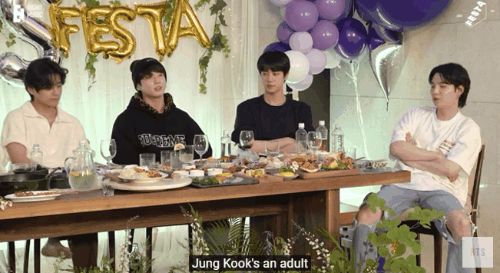
Final Thoughts on the Break, and More on BTS and Psychology (aka Cheryl Actually Gets Personal for Once)
It’s so interesting to see how I think it’s super interesting that I planned my BTS Case Conceptualization project and only wrote Namjoon so far. He’s the external leader, and the one who is so focused on keeping them together. I think it’ll be interesting to write the rest of the members’ case conceptualizations now, knowing that their solo work is right around the corner. Might bring some new light to what I have in store for those pieces, kind of like another experimentation period.
Speaking of experimentation, and feelings…
Some of you may have noticed that I am experimenting with tons of little projects, as well as the structure and content of my fics. Also, so many of you have shared how you’ve been feeling with me, and you’ve asked me how I’ve felt about all of this news, too. Even with all this psychology talk, I’m the kind of person who feels things first, doesn’t really know what to do with those feelings, and only understands them muuuuuuch later.
When I got to see BTS in Las Vegas, I felt odd. I didn’t quite know what it was. I felt frozen, in a way. So I kind of had to let it thaw before I could express it. I think I’m starting to understand what I was feeling. Even before then, I had been telling Roomie / @mochilatae that the guys felt so far away. (Here, I have to say, dear Roomie, thank you for the amazing chat. You know. Even without me having to use the words, because they would fail.) And I still felt that in Las Vegas, when I was literally watching them in concert, and arguably within the closest physical proximity that I will ever be to them. It came to a head that night, I think. I was feeling what Namjoon talked about, this sense of exhaustion, or maybe even disingenuousness. The fabulous Shenee from GAF, as well as other ARMY, have been talking about this shift, and I could see what they were talking about, though I hadn’t associated it with my own feelings. Now, my freeze is making sense.
See, when it comes to other people’s feelings, I tend to be a sponge; I take on what others are experiencing, and I have a hard time separating what I’m truly feeling from what I feel others are feeling. It’s why I didn’t become a therapist. I love psychology, but my love lies in the theory of it. The meaning-seeking, but not necessarily the application. When it comes to the practical matter of helping others, I just couldn’t serve as a container for other people’s emotions. I was taking my work home with me, and I couldn’t do the job. I couldn’t keep my own boundaries well enough to provide that for others. I still can’t. That’s why I’m very, very selective with who I share my real feelings with. And I’m glad that I recognized that before I decided to really pursue my clinical license, because I would have burned out fast.
Because of that, and because of other personal experiences, I definitely have a hard time being vulnerable, especially when I have failed to maintain boundaries, and when people have continuously overstepped the boundaries that I have tried to keep in place.
If you’ve read my fics, you know I have no issues being completely vulnerable in my writing. I love getting to talk about all of these feelings and life themes with you! I love the asks, the posts, the discussions, so please keep them coming!
But I do recognize that when it comes to the fics, I’m using my characters to speak for me. In fact, if you search my “about me” content here, you’ll find that I really have no truly personal posts here. This is arguably the first real “about me” type of post. I like sharing my thoughts, but I still need to find a good balance when it comes to sharing my emotions or the meanings behind them. It’s why I love to write; I really love using characters to play out the scenarios I’ve experienced for me to understand what the truth is beneath them. It helps.
So, take everything that has been going on regarding the break, Namjoon’s fear of sharing that he was exhausted or not living up to people’s standards, the group’s fear of losing ARMY as they take this time to start their next chapter, all the things that the guys have shared, and add this dream that I had last night.
I don’t really do deep dream analysis from a psychodynamic perspective; I am firmly a CBT gal through and through, and after studying memory from a cognitive neuroscience perspective, I follow the perspectives in the field that view dreaming as an information encoding process. Most of the time, I consider my dreams to be like little movies, or episodes of a show. But, like with movies or episodes, I do think dreams can mean things, especially if we feel compelled to assign them meaning.
In my dream last night, I was sleeping, and I woke up in my house (but it wasn’t my actual house) and found all this furniture that I had ordered scattered about the room. Chairs, mattresses, tables, knickknacks. I wasn’t expecting any of it to be there. I got out of bed and found the guys in the living room, where there was even more new furniture laying about, and chatted with them, at some point asking, “Hey, so, when did all of this get delivered and assembled?”
And the guys, except Jungkook (he was around 19-20 yo in the dream), all voiced at the same time that Jungkook was the one who unpacked and assembled everything (lol very Run BTS interior decorating episode). When I looked at him in surprise and gratitude, he just kinda sweetly smiled and shrugged. And I woke up feeling so comforted and taken care of, absolutely amazed that Jungkook would go to the trouble of doing that for me.
Where did this dream come from? Well, cognitive neuroscience me pointed out that I just wrote Blackout because I needed some kind of comfort but wasn’t exactly sure why (and what timing lol). I watched Just One Day and For You before I slept last night. I have been thinking about getting new furniture and reorganizing my room. And I had been thinking about Festa and Jungkook’s 7 mattresses! 🤣
But I also know that I’ve been examining my own need for depth in my personal connections. I have lived my life in a way that has kept me from being truly vulnerable with others, for an amalgam of reasons. Part protection. Part fear. It has served me very well. But it also keeps me from experiencing a certain closeness with people. This is me in Erikson’s Intimacy vs. Isolation stage. While I still think I need to enforce certain boundaries, I think I’m hungry to let a select few in. It’s just a matter of finding the right people to let in, and, happily, I think I’m starting to find them, thanks in part to BTS and ARMY. I need to do more soul-searching, to continue figuring out my own feelings, figure out my voice, figure out what makes me happy. To not be a sponge, and to be my own container. To try new things without being so invested in them that I lose myself in the process.
I’ve so appreciated seeing the discussion around the break. (And if you’re interested in more BTS / psychology takes, here’s the series I’m working on right now!) But I hope this long-ass post, all of this together — Erikson’s life stages, BTS’s examples, and my own personal observations — helps express why I happen to think this break is a good thing. A natural thing. And a necessary thing.
BTS’s break just so happens to coincide with me needing a break from my old patterns as well. So, I’m excited to see what is in store for them next, but more importantly, I’m thrilled to see what this prompts for ARMY — how we continue to grow as people, and how BTS has impacted us / will continue to impact us along the way. 💜
Sources used in this article:
Early and middle adulthood (Boundless Psychology)
Erik Erikson’s stages of psychosocial development (VeryWellMind)
Erikson’s stages of psychosocial development (Wikipedia overview)
Orenstein, G. A. & Lewis, L. (2021). Eriksons stages of psychosocial development. StatPearls.
#bts#bangtan sonyeondan#bts psychology#about me#how i write#personal#bts festa#bts festa 2022#erikson#erik erikson#thanks for reading!#let me know what you think!
39 notes
·
View notes
Photo
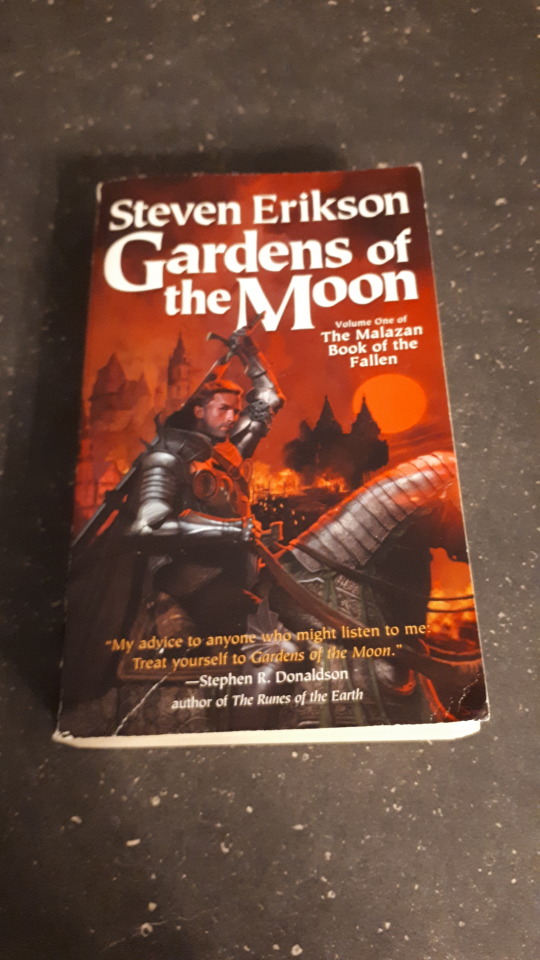
Gardens of the Moon by Steven Erikson
After repeatedly being told to read this series I finally caved, and now I regret not reading it sooner. Erikson is a master at building a complex fantasy world with engaging characters. While Erikson does a lot of "show, don't tell" I have faith that things will either be explained or enough hints will be dropped that the reader can figure it out themselves. And when things are mysterious and not well understood? Well, the characters don't know what the heck is going on either. It feels like you're along for the ride as the Bridgeburners struggle to outsmart and outfight their opponents. It also feels like Erikson, as an author, has faith in his audience's ability to pick up on what he hints at. This is a long series, but now that I have a taste I'm excited to dive into it.
This series feels like the story Brandon Sanderson wishes The Stormlight Archives was.
#book#books#book review#review#review blog#gardens of the moon#steven erikson#malazan#malazan book of the fallen#the book look#bookstagram#fantasy#epic fantasy#High Fantasy#bridgeburner#erikson#bookblr#fiction
6 notes
·
View notes
Text
Identity Crisis
German-American psychologist and psychoanalyst Erik Homburger Erikson was born on 15 June 1902 in Frankfurt, Germany.He is best known for his theory of psychosocial development and the concept of “identity crisis”, one of the most important conflicts people face during the developmental process.
His theories marked a major shift in dealing with personality: instead of focusing simply on the…

View On WordPress
#children#conflict#crisis#development#Erikson#father#identity#interdependence#old age#patience#personality#process#psychology#stages#surname
3 notes
·
View notes
Text
I was doing a review of psychology across the lifespan and I’m really tired of Erik Erikson. Surely, we have newer people to focus on. Surely, surely, we don’t need to use the guy who was barely born in the 1900s and institutionalized his daughter who had Down Syndrome.
Reminds me of how the Big Psychology Guy is constantly Freud. Bro got scared by his peers and decided to claim that everybody wants to fuck their parents.
We must have newer people exploring psychology and creating better theories nowadays. With the rise of awareness in mental health and neurodivergence, it's weird that we keep using sources that are ancient.
In other areas, we constantly strive for the most accurate and recent information, so it's just kinda wild to use 50+ year old information related to the mind.
#psychology#growth and development#nursing student#neurodivergent#freud#fucking freud#erikson#erik fucking erikson
1 note
·
View note
Text
KURAMCILARA GÖRE KİŞİLİK
Genel bir tanım yapacak olursak kişilik; bireyin davranışları, konuştukları, düşünceleri, duyguları, bakış açıları bunların yanında doğuştan getirdikleri ve sonradan kazandıkları özelliklerin bütünüdür diye tanımlayabiliriz.
Jung’a gore kişilik iki şeyden oluşur. Bunlardan biri bilinç ve içinde bulundurduğu her şey, ikincisi ise bilincin dışında kalan yani bilinçdışıdır.
Freud’un psikanalitik kuramına göre kişilik yapısı üçe ayrılır. İd(altben), ego(ben), süperego (üstben). İd; kişilik yapısının en ilkel sistemidir. Daha sonra bunun üzerine ego ve süperego gelişir. Doğuştan gelir ve cinsellik ve saldırganlık dürtülerinden oluşur. Ego; id’in istekleri karşısında bir sınır koyucu, engelleyici görevini üstlenir. Oluşan ihtiyacın doyumunu sağlamak adına gerçekçi yol arar. İd herhangi bir istekte bulununca süperego ile çatışır. Ego devreye girer ve bir nevi arabulucu bir görev yapar. Süperego; id ve egoyu sınırlayan kısımdır.
Adler ise çocukluk döneminde yaşadıklarımızın etkisi kişiliğime yansır demiştir. Yaklaşık beş yaşına geldiğinde bireyin kişiliği şekillenir ve sonraki yaşamlarda pek bir değişiklik oluşmaz diye görüş ifade eder.
E.Fromm, insanın davranışlarının bulunduğu kültürün bir ürünü olduğunu söyler.
Erikson, kişiliği açıklamak için “aşamalı oluşum ilkesine” başvurur. Bireyin kişilik oluşumu daha anne karnından itibaren başlar ve dünyaya geldikten sonra devam eder diye açıklar. Anne karnında kişiliğin temelleri bir organ gibi oluşur ve doğumdan sonra da hızlı ve belirli bir sıra içinde gelişir
0 notes
Text

Teoria Ecológica (Bronfenbrenner) e Teoria do Desenvolvimento de Duração da Vida (Erikson).
Fonte da imagem: Faculdade Bookplay
#Teoria Ecológica (Bronfenbrenner) e Teoria do Desenvolvimento de Duração da Vida (Erikson).#erikson#bronfenbrenner#neuropp
0 notes
Text
Discovering Who You Are: The Lifelong Journey of Identity Formation
As we transition from adolescence to adulthood, we go through a critical period of self-discovery and identity formation. It’s a time when we begin to ask ourselves, “Who am I?” and “What do I want to become?” This process can be challenging, but it’s an essential step towards personal growth and development.
The process of understanding the self and the formation of identity involves a deep…
View On WordPress
#adolescence#adulthood#Erikson#identity#introspection#life stages#personal growth#personal identity#psychosocial development#self-acceptance#self-awareness#self-discovery#self-esteem#self-expression#self-identity#self-improvement#self-realization#self-reflection#self-understanding
0 notes
Text
Horny BBw Ebony playing with wet pussy
esposa japonesa chupando pollas negras junto a esposo durmiendo
Recebendo Boquete da Loira de Buceta Carnuda
Carmen Valentina Interview
Dirty Girl Play Creamy Anal II
Baiana no boquete
BLACKEDRAW Petite cutie Elle loves riding Isiahs huge BBC
hot milf dancing sexy and showing meaty lips in fluffy pussy and moaning loudly when cums GinnaGg
Naughty Teen Picked Up and Gets Her Pussy Eaten
Extreme deep anal with horse cock
#Erikson#igad#studdie#ephemeral#chiselers#heparinizing#auscultative#alberghi#fringing#Neuilly#mansuetude#vaticinatory#skinnyyy#seriosities#sinuslike#contestants#rosaries#intercausative#Chlamyphorus#overclement
0 notes
Text
Si quieres conocer más sobre los distintos tipos de apego y procesos psicológicos lee nuestro texto sobre las teorías de Erik Erikson en nuestro perfil ��✌
El principal trabajo de Erikson fue extender los estudios del psicoanálisis del desarrollo psicosexual y el psicosocial del ciclo de la vida completo de las personas, dividiendo la investigación en estadios psicosociales que contemplan un rango de edad predeterminado.
Bordignon. A & Erikson. E (2006) El desarrollo psicosocial- revista lasallista de investigación - VOL. 2 No. 2
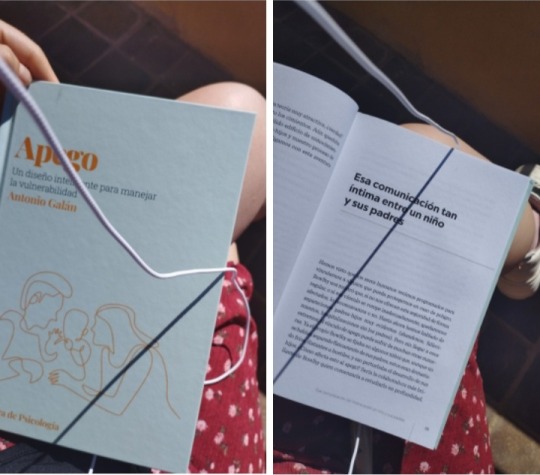
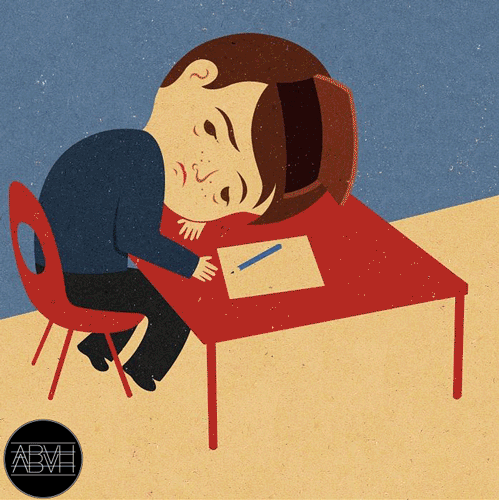
1 note
·
View note
Photo
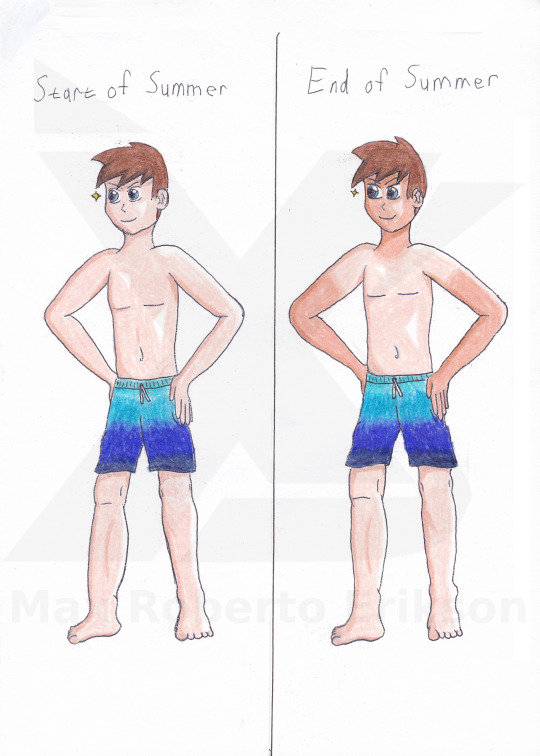
maX at the Start and End of Summer
I decided that I wanted to get a light tan this summer, but it didn't work out.
You can also view this on DeviantArt: https://www.deviantart.com/maxerikson/art/maX-at-the-Start-and-End-of-Summer-932093596
#max#erikson#maxerikson#maxrobertoerikson#max_erikson#swimsuit#summer#trunks#tan#drawing#paper#pen#pencil#colored
1 note
·
View note
Photo

#autismo #guidarapidaperinsegnanti #erikson #mondadoripoint #mondadoripointsantantioco #mondadoripointsantantioco2022 (presso Mondadori Point) https://www.instagram.com/p/Chth4PLKNS4/?igshid=NGJjMDIxMWI=
#autismo#guidarapidaperinsegnanti#erikson#mondadoripoint#mondadoripointsantantioco#mondadoripointsantantioco2022
0 notes

